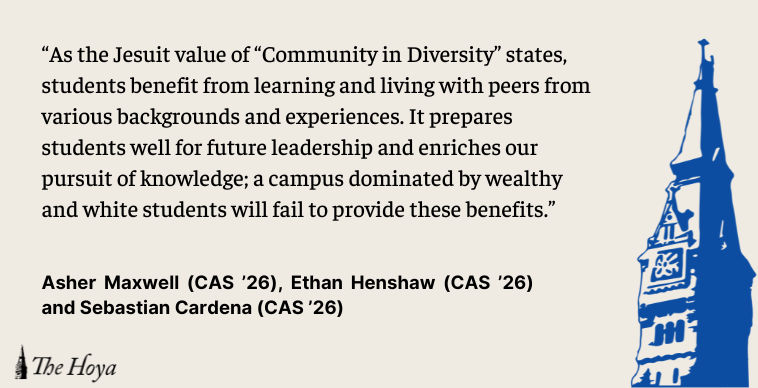As a result of the Supreme Court’s rulings in Students for Fair Admissions Inc. v. Presidents and Fellows of Harvard College and Students for Fair Admissions Inc. v. University of North Carolina which banned race-conscious admissions, Georgetown University is facing a major crisis in ensuring continued diversity on campus. In his response to the decision, President John DeGioia called for pursuing “new ways of restoring [the] hope” that affirmative action offered.
Any such attempt to restore affirmative action’s promise of a more equitable future must begin with eliminating the university’s legacy admissions policy.
Due to the long history of racism in elite college admissions in the United States, the pool of legacy applicants is overwhelmingly white. These legacy students are also predominantly wealthy and tend to come from economically-advantaged regions of the U.S., specifically the Northeast.
In The New York Times’ updated College Access Index, Georgetown placed 230th out of 283 universities in economic diversity, measured by the number of Pell Grant recipients admitted in an average first-year class. A similar study from Harvard University showed that Georgetown admits wealthy students at 2.9 times the normal rate. As long as the scales are tipped toward legacy and wealthy students in the admissions process, Georgetown will face increased difficulty in maintaining a diverse and representative student body.
To put a fine point on it, there are more legacy students than Black or Latinx students in Georgetown’s undergraduate population. These already privileged students receive a significant boost in their chances of admission to Georgetown — in 2017, legacy students were twice as likely to be admitted compared to non-legacy students.
At other elite universities, such as Harvard and Princeton University, the admissions advantage for legacy students can climb to six times higher than non-legacy students. Some of these students are more than qualified for admission to Georgetown, and by abolishing legacy admissions, Georgetown would allow these students to be accepted on their own merits, not their parents’.
Of course, calls to end legacy preference for children and grandchildren of alumni must not be conflated with ending the admissions preferences given as reconciliation to descendants of the GU272+ — the 314 enslaved people the Maryland Jesuits, who operated Georgetown in 1838, sold to financially sustain the university. Such policies are fair and make up for past transgressions by aiding students more likely to be economically disadvantaged, as opposed to children of alumni, who already enjoy tremendous advantages.
In his response later, President John DeGioia cited a report from Georgetown’s very own Center on Education and the Workforce.
“Achieving more racial/ethnic diversity at selective colleges … likely hinges on abandoning the use of legacy preferences in admissions practices,” the report reads.
Without eliminating legacy preference, the homogenization of our student body will undermine a crucial element of Georgetown’s learning environment: diversity.
As the Jesuit value of “Community in Diversity” states, students benefit from learning and living with peers from various backgrounds and experiences. It prepares students well for future leadership and enriches our pursuit of knowledge; a campus dominated by wealthy and white students will fail to provide these benefits.
The benefits of ending legacy admissions, however, extend far beyond campus. Georgetown plays an important role in offering a pathway to socioeconomic mobility for many. When students who are already wealthy are given a leg up in admissions, Georgetown perpetuates the gross economic inequality that exists in the United States.
Proponents of legacy preference often argue that preserving legacy preference encourages alumni to donate to the university, and by refusing to boost the admission chances of their children, alumni will lose their sense of attachment to this community and the size of their donations to the school will fall.
The problem with this narrative is it is not backed up by evidence. A study published in 2010 found that, when controlling for the wealth of their students, schools are no more likely to receive alumni donations if they have a legacy preference in admissions than if they do not.
Charles Deacon, the dean of Georgetown admissions, justified continuing legacy admissions by arguing that legacy student tuition helps fund financial aid. The unfair cycle of legacy admissions, however, is not how Georgetown can best support its financially disadvantaged students.
The Georgetown Scholars Program (GSP), which supports first-generation, low-income students, lacks a dedicated endowment, despite calls for the university to replace its donations-based model. If the university truly hopes to create a more equitable college experience for first-generation, low-income students, it must get serious about funding the program, rather than use it as a talking point to prop up an unjust admissions policy.
Furthermore, the fictitious threat of lost donations is not nearly as dire as some would make it seem. Alumni donations at American universities account for less than a quarter of total donations, and donor contributions only make up 2.7% of Georgetown’s total operating revenues, according to a 2022 study from the Council for Advancement and Support of Education. Any potential loss in alumni donations would hardly affect the university’s total budget.
It is especially telling that the administration has chosen to stand by legacy admissions for so long, given its dark history. The practice emerged in the early twentieth century as a means to protect Anglo-Protestant dominance of elite universities due to fears of the increasing number of Catholic and Jewish applicants. The same tool that was once used to protect an anti-Catholic religious hierarchy in America now upholds a racial, class and geographic hierarchy.
If you agree that it is time for Georgetown to guarantee diversity and fairness in admissions, then we urge you to read, sign and share this petition and demand that Georgetown end its unjust and harmful legacy admissions policy.
Asher Maxwell, Ethan Henshaw and Sebastian Cardena are sophomores in the College of Arts and Sciences.














